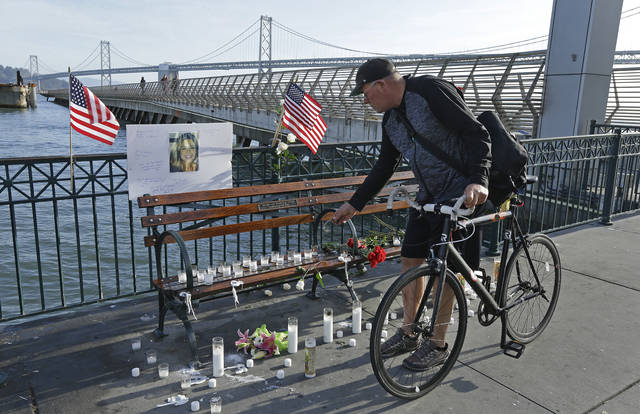SAN FRANCISCO — The attacks on San Francisco and other cities with similar immigration policies began moments after a jury acquitted a Mexican man charged with killing a woman on a popular pier.
President Donald Trump called the verdict a “complete travesty of justice,” and U.S. Attorney General Jeff Sessions demanded cities like San Francisco scrap immigration policies barring cooperation with federal deportation efforts.
Thousands of Twitter users turned to the hashtag #BoycottSanFrancisco. Conservative politicians and celebrities such as former Alaska Gov. Sarah Palin and actor James Woods lambasted the city.
City officials pushed back and vowed to stand behind their so-called sanctuary city policy. It’s what led Garcia Zarate to be released from San Francisco’s jail despite a federal request to detain him for deportation several weeks before Kate Steinle was fatally shot in the back in 2015. He had been deported five times before.
“San Francisco is and always will be a sanctuary city,” said Ellen Canale, a spokeswoman for Mayor Ed Lee.
It was among the first U.S. cities to establish a sanctuary law in 1989 as part of a national wave of cities adopting policies to help Central American refugees.
Since then, San Francisco has consistently been an early adopter of some of the most immigrant-friendly policies nationwide, expanding protections to residents living in the country without documentation.
Hundreds of cities have similar policies, which Trump, Sessions and others blame for Steinle’s death.
Prosecutors had charged Garcia Zarate with murder, assault and being felon in possession of a firearm. He called the shooting an accident. He said he found a gun under a chair on the pier and it fired when he picked it up.
San Francisco Deputy District Attorney Diana Garcia urged jurors to convict him of first-degree murder. Jurors also considered and rejected second-degree murder and involuntary manslaughter.
They did convict him of the firearm charge, which carries a maximum sentence of three years in jail. U.S. Immigration and Customs Enforcement said it would “ultimately remove” Garcia Zarate from the country.
Before the shooting, he had finished a federal prison sentence for illegal re-entry into the United States and had been transferred to San Francisco’s jail in March 2015 to face a 20-year-old charge for selling marijuana. The sheriff’s department released him a few days after prosecutors dropped the marijuana charge, despite a request from federal officials to detain him for deportation.
“San Francisco’s decision to protect criminal aliens led to the preventable and heartbreaking death of Kate Steinle,” Sessions said in a statement Thursday night. “I urge the leaders of the nation’s communities to reflect on the outcome of this case and consider carefully the harm they are doing to their citizens by refusing to cooperate with federal law enforcement officers.”
ICE Deputy Director Thamos Homan said the city’s policy “is a blatant threat to public safety.”
At the time of the shooting, then-candidate Trump and others pointed to Steinle’s death as reasons why the country’s immigration laws should be tightened.
The president called the verdict “disgraceful” Thursday. And Friday on social media, Trump said, “The Kate Steinle killer came back and back over the weakly protected Obama border, always committing crimes and being violent, and yet this info was not used in court.”
“His exoneration is a complete travesty of justice. BUILD THE WALL,” Trump tweeted.
Former President Barack Obama had kept his Republican predecessor’s policy of allowing U.S. immigration officials to ask local police to detain people suspected of living in the country illegally for up to 48 hours.
Defense attorney Francisco Ugarte called the verdict a “vindication for the rest of immigrants.”
“From Day 1, this case was used as a means to foment hate, to foment division and to foment a program of mass deportation,” he said. “It was used to catapult a presidency along that philosophy of hate of others.”
Jurors left the courtroom Thursday without comment, and the judge sealed their identities.
Steinle’s father, Jim, told the San Francisco Chronicle that “justice was rendered, but it was not served.”
“We’re just shocked — saddened and shocked … that’s about it,” he said in an interview described as the family’s last.
Michael Cardoza, a longtime San Francisco Bay Area lawyer, said the prosecutor overreached asking for a first-degree murder conviction, which would have meant that Garcia Zarate intended to kill Steinle despite strong evidence that the bullet ricocheted around 90 feet (27 meters) before striking Steinle.
Cardoza said a better case could have been made to convince jurors that Garcia Zarate had a “reckless disregard for human life” and to convict him of second-degree murder.
Garcia, the deputy district attorney, declined to comment. Alex Bastian with the district attorney’s office said the verdict “was not the one we were hoping for” but that prosecutors respect the jury’s decision.


